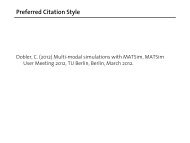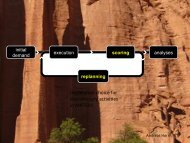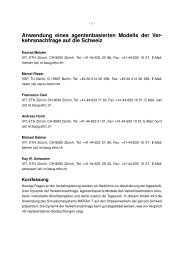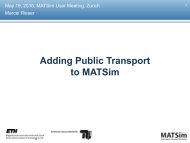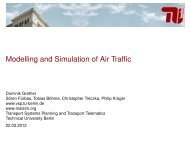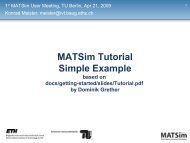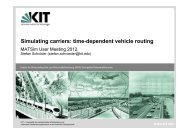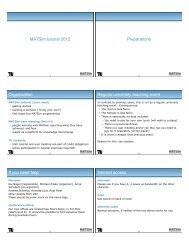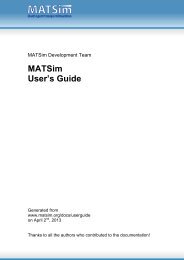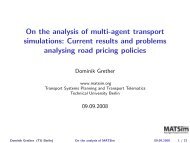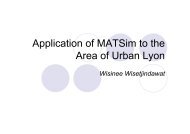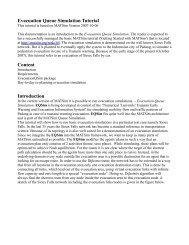User's Guide.pdf - MATSim
User's Guide.pdf - MATSim
User's Guide.pdf - MATSim
Create successful ePaper yourself
Turn your PDF publications into a flip-book with our unique Google optimized e-Paper software.
Traveller increases arriving early (by amount deltaEtime)In that situation, the traveller will "do nothing" between the arrival and the opening time of the activity. That is, the amount of time thatthe traveller is doing nothing is now increased by deltaEtime. Consistent with the meaning of the Vickrey parameter "marginal utility ofarriving early", we assume that the travel time is the same compared to the later arrival. This means that the preceeding activity was cutshorter by deltaTtime. We thus have the following (linearized) modifications of the utility:The preceeding activity is shortened by deltaTtime; the (linearized) utility change is - beta_perf * deltaEtime . beta_perf is typicallypositive, so the contribution is negative.There are no other contributions, since the time between the arrival and the opening time prodices neither positive nor negative utilitycontributions. Overall: The (linearized) utility change caused by arriving early is( - beta_perf ) * deltaEtimeThat is, as long as there are no additional utilities or disutilities of waiting, the marginal utility of performing can be approximated by themarginal utility of schedule delay early.Traveller increases arriving late (by amount deltaLtime)In this situation, we have the following (linearized) modifications of the utility:The preceeding activity is extended by deltaLtime; the (linearized) utility change is beta_perf * deltaLtime . beta_perf is typicallypositive, so the contribution is positive.The following activity is shortened by deltaLtime; the (linearized) utility change is - beta_perf * deltaLtime . beta_perf is typicallypositive, so the contribution is negative (and exactly cancels the previous contribution).Arriving late is increased by deltaLtime; the (exact) utility change is beta_late * deltaLtime . beta_late is typically negative, so thecontribution is negative.Overall: The (linearized) utility change caused by increasing the amount of arriving late isbeta_late * deltaLtimeOverallOverall, calibration of the Charypar-Nagel scoring function is best done as follows:Run a survey and estimate logit models that include penalties for travelling (by mode), schedule delay early, andschedule delay late.The marginal utility of schedule delay early from the logit model, multiplied by minus one, results in the <strong>MATSim</strong>beta_perf. Since the marginal utility of schedule delay early is typically negative, beta_perf is thus typically positive. This is themarginal opportunity cost of time. A useful interpretation is that this is the difference between "leisure" and "doing nothing".The marginal utility of travelling from the logit model, plus beta_perf, results in the <strong>MATSim</strong> beta_trav (by mode).That is, the <strong>MATSim</strong> beta_trav is an additional utility offset when compared to doing nothing. Since driving can well be seen as morepositive than doing nothing (e.g. because of making phone calls, listening to music, enjoying to drive), the <strong>MATSim</strong> beta_trav can well bepositive.(Note that this has still nothing to do with "positive values of travel time", e.g. by Susan Handy. Those positive values imply that theadditional utility offset over-compensates the marginal opportunity cost of time. In other words, "time spent driving home" is (to anextent) seen more positive than "being at home".)The marginal utility of being late from the logit model results in the <strong>MATSim</strong> beta_late.Note that you also need reasonable values for opening time, latest arrival time, and closing time, in order to achieve that the scheduledelay cost mechanics works in <strong>MATSim</strong>. This is quite clear if you think about it; nevertheless, it has been forgotten uncountable times(in particular in studies that start from trips, not from full daily plans).Without schedule delayIf you intend to run <strong>MATSim</strong> without time adaptation (TimeAllocationMutator), these things are not that critical. In that situation, you justneed to make sure that - beta_perf + beta_trav matches your marginal utility of travel time differences. An easy way in our view is:Set beta_car to zero (i.e. assume that driving is as good or bad as doing nothing).Set beta_perf to the estimated marginal utility of travel time savings (make sure you get the sign right; beta_perf should be positive).Set (say) beta_pt to your estimated marginal utility of travel time savings (should be positive) minus the <strong>MATSim</strong> beta_perf. The resultmay be positive (implying that spending time using the mode is better than doing nothing) or negative (implying that spending timeusing the mode is worse than doing nothing).Note that even without time adaptation, beta_late may still have an influence if you have set the latest arrival times for some activities.Full version"Full version" would imply that we could calibrate the <strong>MATSim</strong> parameters also for situations where the actual activity durations are farfrom their "typical" values. This could happen for two reaons:There are too many activities that need to be squeezed into a day. A possible interpretation would be that beta_perf corresponds to themarginal utility of additional leisure time on, say, sundays, but the weekday activites cannot be shifted to sundays.There are too many activities that need to be squeezed into certain time periods, say between day care opening and closing, or into



